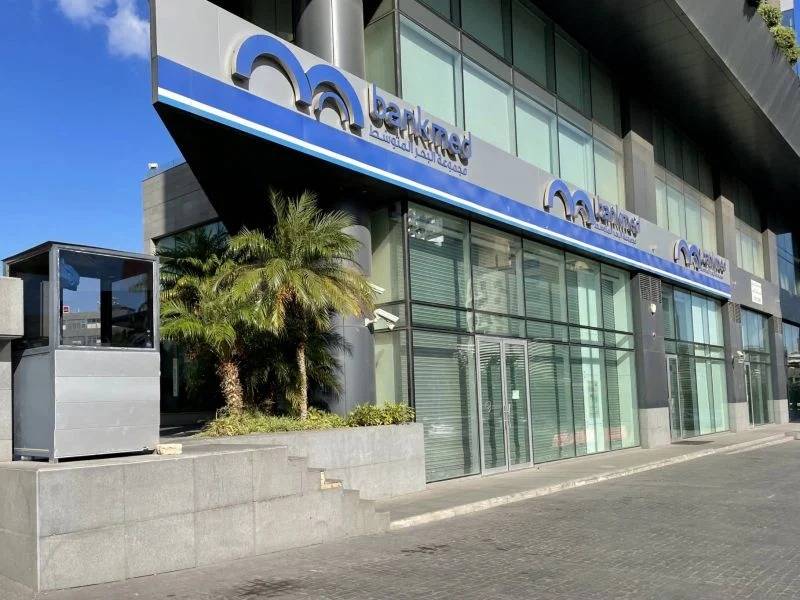
A Bankmed branch in Sin al-Fil. (Credit P.H.B.)
Banks in Lebanon are set to maintain the use of the official exchange rate of at least LL15,000 to the dollar for their balance sheets, according to three sources within the management of various banking establishments who spoke on the condition of anonymity.
The secretariat of the Association of Banks in Lebanon (ABL) said it had “no information on this subject.”
Two of the sources mentioned earlier revealed that the Banque du Liban (BDL) has been contemplating, in recent months, the possibility of mandating banks to use the rate of LL90,000 to the dollar starting from Jan. 1, 2024, for assessing the actual value of banks’ assets and liabilities.
This proposed rate aligns with the market rate, in contrast to the LL15,000-to-the-dollar rate enforced since Feb. 1, [2023], which has been maintained until now.
According to ones of the precited sources, “It seems like nothing will transpire until the State budget for 2024 is officially implemented.”
The bill is presently under consideration in Parliament, with a voting deadline set until the end of January.
In the event of a failure to reach an agreement during the plenary session, the caretaker government, which successfully passed the bill on time in 2023 — a first after a prolonged period — will endeavor to enforce it through a decree.
“Even if the budget is approved, whether it enforces the market rate suddenly or gradually, it remains uncertain whether BDL will automatically mandate banks to compute their balance sheets using the market rate,” one of the sources explained. “This decision is weighed against the potential ramifications, especially in light of a sector restructuring process that has been delayed for four years.”
In practical terms, this scenario raises the possibility of all banks being declared bankrupt.
“The repercussions of BDL finally imposing this rate change for balance sheet calculations are unpredictable, leaving uncertainty about which banks will maintain balanced sheets and which ones will end up in the red,” the source added.
Ramifications of the crisis
The ability of banks in Lebanon to continue calculating their balance sheets at an exchange rate significantly below that of the parallel market is a direct consequence of the crisis that engulfed the country since 2019. The crisis led to the collapse of the Lebanese financial system, once a cornerstone of the economy, as well as the depreciations of the Lebanese currency, which had long been pegged at LL1,507.5 to the dollar.
Up until Feb. 1, [2023], banks persisted in using this rate to compute their balance sheets, despite the evident depreciation of the Lebanese lira.
By proceeding this way, whether employing a rate of LL1,507.5 or LL15,000 to the dollar, banks can artificially inflate the value of their assets and liabilities denominated in Lebanese lira.
This practice serves to mask the true financial condition, particularly regarding their foreign exchange positions. These positions represent the disparity between their overall assets and receivables and their total liabilities in a specific currency — in this instance, the dollar.
This specifically entails computing the equivalent in Lebanese liras of dollar deposits at their market value rather than at the fixed rate of LL15,000 to the dollar, resulting in a multiplication of this amount by six.
Additionally, this move effectively eliminates any accounting distinctions between old and new foreign currency deposits. The former are subject to illegal restrictions imposed by banks, limiting depositors’ access to their funds. Meanwhile, the latter consists of funds that entered the banking sector later, and since April 2020, BDL has prohibited banks from applying similar restrictions.
It's worth noting that banks were also compelled to permit customers to repay loans taken in dollars with lira at the official rate during a portion of the crisis, although this measure did not entirely rectify the situation.
Elevating the exchange rate employed for balance sheet calculations will substantially devalue banks’ assets and liabilities in Lebanese lira when expressed in dollars, and vice versa.
In the event of restructuring, retailers burdened with a negative exchange rate position on their liabilities become prime candidates for potential liquidation or merger.
As of now, Parliament has yet to enact any legislation to address this concern or the allocation of losses.
Permitting banks to use an exchange rate significantly divergent from the parallel market, when preparing one of the most crucial accounting documents for an institution’s reputation, has been one of the tactics employed by BDL to save time for a sector that, technically, has been insolvent for four years — even if not all banks share the same predicament.
Moreover, BDL has employed various strategies over the past four years to buy time for the financial system.
Notably, there was the fact that banks, the majority of which have refused to return their customers’ “old” dollar deposits since 2019, have not been compelled to declare bankruptcy. The options provided, such as liquidating these deposits incrementally (via Circular No. 158) or offering them at a significant discount (Circular No. 151, expired on Dec. 31, 2023, with its effects yet to be extended), serve as additional levers employed by BDL to manage the ongoing crisis.
Despite a few adjustments and a change in leadership at the helm, these maneuvers have generally persisted. The former governor since 1993, Riad Salameh, stepped down at the end of July, making way for his first deputy governor, Wassim Manssouri.
Meanwhile, banks continue to place sole responsibility on the state and BDL for their predicament. They have invested billions in Lebanese debt securities (Eurobonds), which the government defaulted on in March 2020 without initiating a restructuring. Additionally, they have deposited significant sums with BDL, which lacks adequate foreign currency reserves for repayment.
In December, ABL initiated proceedings before the administrative judge, formally urging the government to settle nearly $68 billion in commitments to BDL within two months. This action serves as a prelude to potential legal measures to assert their position.
This article was originally published in L'Orient-Le Jour. Translated by Sahar Ghoussoub.